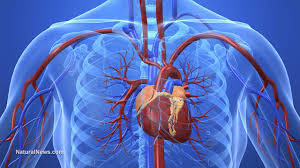Uncontrolled high blood pressure is of considerable concern because of what harm it can do to the HEART, BRAIN, and KIDNEYS, if it remains uncontrolled:
Heart=Angina to Heart Attack (infarction) 2- Brain=Transient Ischemia Attack (TIA) to a stroke 3- Kidneys=Reducing blood suppy to kidneys causing the kidneys to secrete RENIN into the blood. This enzyme breaks down angiotensin from the plasma protein (a powerful blood constrictor in the blood ) making the blood pressure higher. It stimulates aldosterone release in our blood stream that promotes sodium and water retention in the blood ,= increases your B/P more due to how it works.
These 3 organs with conditions are all due to obstruction of blood flow to the organs and due to the effect the high blood pressure climbs, and the heart must work or pump harder=things that happen to our engine/heart:
One, the heart muscle tissue eventually thickens and the heart becomes ENLARGED causing it not to do its job properly causing it to go in time into failure.
Two, is stress to the heart = lack of oxygen = chest pain (angina) or myocardial infarction (heart attack). When we stress the heart out=overworked, lack of oxygen to the heart tissue happens = pain as a symptom (we call it Angina that can be reversed) and if it continues it can lead to a heart attack = scarring to the heart tissue= damage done to the heart that’s not reversible. Also with constant HTN which can cause constriction of vessels in the brain this can cause the same stress but with different symptoms, the brain with uncontrolled HTN can cause lack of oxygen to the brain = headache which if not resolved can lead to a TIA (reversible) or stroke (scarring to the brain, not reversible). All of these responses are made worse by low potassium intake and high sodium intake orally (in a lot of cases these conditions could have been controlled via diet, exercise with balancing it with rest and check up with a doctor (cardiac especially).
2 – Arteriosclerosis or Atherosclerosis both = CAD (Coronary Artery Disease)
This is a common disorder, typically affecting men over age 50 and women as well but possibly earlier. People are at higher risk if they have a personal or family history of coronary artery disease (heart disease) or cerebrovascular disease (stroke), diabetes, smoking, hypertension (high blood pressure), or kidney disease involving hemodialysis. Than live healthy if you want to live longer and not get these risks or even if you do have them already than be compliant in reaching your optimal level of health with the disease. If no history and not diagnosed yet with any of these but want to prevent it live healthy, if you’re not. Arteriosclerosis is hardening of the arteries, which occurs with aging (wear and tear from also practicing bad habits that takes over years allowing this to form not just due to age; that’s why most books state it happens later in life. As opposed to adults not too many with cardiac disease young). Atherosclerosis is a form of arteriosclerosis but this is the lipid related arterial lesion, is the major disease responsible for the principle clinical complications = BLOCKAGE in the arteries. Definitely affected if already with high cholesterol and fats in the diet and of course smoking from tar build up in the vessel. Over time CAD can weaken the heart muscle also causing the heart to go into decompensation causing symptoms of chest pain=angina to even a heart attack. This may lead to heart failure, a serious condition where the heart can’t pump blood the way that it should. Even an irregular heartbeat, or arrhythmia, can also develop that if it gets worse could lead into cardiac arrest. The CDC states under CHF (congestive heart failure) “Diseases that damage your heart—including coronary heart disease, high blood pressure, and diabetes—are common causes of heart failure. Smoking; being overweight; eating foods high in fat, cholesterol, and sodium; and physical inactivity also increase your risk of developing heart failure.” Let’s wake up America with health and practicing good habits to decrease your risk of developing these diseases.
High Cholesterol levels — High cholesterol is one of the leading causes of heart attacks. Cholesterol is transported through your blood in two ways: the low density lipoprotein (LDL), which transports cholesterol to the cells that need it, and the high density lipoprotein (HDL), which is the healthy cholesterol that reduces your risk for heart attack. Having high LDL levels raises your risk of having heart disease by 20%. Losing 11-20 pounds can help you significantly reduce your cholesterol level so you prevent blockage from occurring preventing heart attack and atherosclerosis.
A sedentary lifestyle and lifetime lack of exercise seems to be major contributing factors for getting arteriosclerosis and heart-disease onset; see how they all interrelate with one causing another people.
Starting to get it? That based on how healthy you live in many cases is the determining factor of how you turn out regarding disease, but there are non-modifiable risk factors to disease (not controllable) = 1.) Age 2.) Sex (Ex. A higher amount of cases with HTN are males vs. females). 3. Race (Ex. African American have a higher count in HTN than Caucasian) 4. Heredity.
Modifiable Risk Factors (things you can change that effect diseases) = 1- weight 2- smoking 3 – living conditions 4 – diet 5 – The health & unhealthy habits you practice.
How to prevent these cardiac conditions all listed above, don’t live the type of life that’s unhealthy, at least on a regular basis (if at all occasionally live unhealthy – Ex. eating fast foods) to decrease the chances of developing these cardiac conditions that are high in America now and have been for several years. Need help and guidance in how to go about this; then you are on the right website. The answer to prevention or treatment of cardiac disease is in changing or modifying your diet, if it’s unhealthy 100% or just partially. The answer includes exercise (from just walking fast or if you like working out, even better) and if needed medication your doctor will decide that, particularly cardiac – the specialist for this area. All these changes can modify your blood lipid profile = cholesterol control, which helps increasing your heart to a better tolerance with activity, stress and simply functioning. Recommended is going to a cardiologist for people diagnosed with heart conditions or your general practitioner with any illness/disease before making changes to help guide you towards the right choices. Your doctor can help you in determining which prevention or treatment plan is best for you.
Bad Foods high in cholesterol too avoid = Fast foods, whole fat dairy products = milk/cheese/ butter/mayonnaise/bacon/processed deli meats/salad dressings/shortening.
The key is to living a healthy life overall. This consists of diet, exercise or activity and healthy habits learned and practiced routinely in your life that will help prevent or assist you in treating cardiac disease. The better we treat ourselves regarding health the higher the odds we will live a longer life. It is pretty simple. There is not just one food to eat or one type of exercise to do or one healthy habit to keep you healthy, there are choices.


